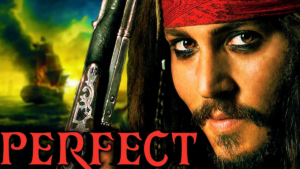Why Pirates of the Caribbean is the Most Underrated Trilogy: A Deep Dive into the Swashbuckling Saga
In the vast ocean of Hollywood blockbusters, few franchises have captured the imagination and adoration of audiences quite like Pirates of the Caribbean.
Yet, despite its immense popularity and box office success, the Pirates of the Caribbean trilogy often finds itself overlooked and underrated in discussions about cinematic greatness.
In this video essay, we’ll explore why the Pirates of the Caribbean trilogy deserves more recognition and appreciation for its storytelling, characters, and cultural impact.

Introduction:
The Pirates of the Caribbean trilogy, consisting of “The Curse of the Black Pearl,” “Dead Man’s Chest,” and “At World’s End,” burst onto the silver screen in the early 2000s, captivating audiences with its blend of swashbuckling adventure, supernatural elements, and memorable characters.
Led by the irrepressible Captain Jack Sparrow, portrayed with unparalleled charisma by Johnny Depp, the trilogy introduced viewers to a world of pirates, curses, and high-seas hijinks unlike anything seen before.
The Curse of the Black Pearl:
The journey begins with “The Curse of the Black Pearl,” a rollicking adventure that sets the stage for the rest of the trilogy. Directed by Gore Verbinski and written by Ted Elliott and Terry Rossio, the film follows the exploits of Captain Jack Sparrow as he teams up with blacksmith Will Turner, played by Orlando Bloom, to rescue the governor’s daughter, Elizabeth Swann, portrayed by Keira Knightley, from the clutches of cursed pirates led by the nefarious Captain Barbossa, played by Geoffrey Rush.
Key Themes and Elements:
At its core, “The Curse of the Black Pearl” is a tale of redemption, revenge, and the search for freedom. It explores themes of identity, loyalty, and the blurred lines between good and evil, all set against the backdrop of the Golden Age of Piracy. The film’s expertly crafted screenplay, combined with stunning visual effects and a swashbuckling score by composer Klaus Badelt, immerses viewers in a world of adventure and intrigue, where danger lurks around every corner and treasure lies hidden beneath the waves.
The Rise of Captain Jack Sparrow:
Dead Man’s Chest and At World’s End:
Building on the success of “The Curse of the Black Pearl,” the Pirates of the Caribbean trilogy continued with “Dead Man’s Chest” and “At World’s End,” which were filmed back-to-back and released in 2006 and 2007, respectively. These sequels expanded the scope and scale of the franchise, delving deeper into the mythology of the Pirates universe while raising the stakes for our beloved characters.
Epic Storytelling and Spectacle:
“Dead Man’s Chest” and “At World’s End” are epic in every sense of the word, featuring sprawling narratives, grand set pieces, and breathtaking visual effects. From the heart-pounding chase through the jungle to the climactic battle on the high seas, these films deliver spectacle on a scale rarely seen in modern cinema. Director Gore Verbinski’s masterful direction, combined with a talented ensemble cast and cutting-edge special effects, creates an immersive cinematic experience that transports viewers to a world of magic, mystery, and mayhem.
Cultural Impact and Legacy:
Despite their critical and commercial success, the Pirates of the Caribbean trilogy often gets overshadowed by other blockbuster franchises. However, its influence on popular culture cannot be overstated. From Halloween costumes to theme park attractions, the Pirates franchise has left an indelible mark on the zeitgeist, inspiring countless imitators and cementing its status as a modern classic. Moreover, the trilogy’s themes of freedom, adventure, and camaraderie resonate with audiences around the world, making it a timeless and enduring favorite.
Conclusion:
In conclusion, the Pirates of the Caribbean trilogy stands as a testament to the power of storytelling and the magic of cinema. From its unforgettable characters to its epic set pieces, this swashbuckling saga continues to captivate audiences and inspire filmmakers decades after its initial release. While it may be underrated in some circles, there’s no denying the lasting impact and cultural significance of the Pirates of the Caribbean trilogy. So, the next time you set sail for adventure, be sure to raise a toast to Captain Jack Sparrow and the crew of the Black Pearl. Yo ho, yo ho, a pirate’s life for me!





